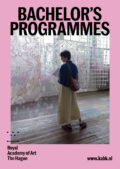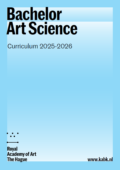Programme description
The full-time Bachelor ArtScience focuses on an interdisciplinary approach and teaches you how to connect and transcend various art forms and areas of expertise. The programme contains amongst others the following educational components: research projects, individual coaching, (often combined) theoretical and practical courses.
A defining aspect of our curriculum is that you will have a considerable amount of freedom in choosing programme components while receiving intensive supervision by a coach whom you personally choose in the second semester.
Programme structure
The Academic Year at the Interfaculty is organised in two semesters or 4 blocks, categorised as ‘Input’ or ‘Output’. During the programme students choose from a range of courses offered by the department plus courses offered by other programmes within the university or elsewhere. In addition, a lot of time is reserved to develop their individual projects under supervision.
The two semesters are divided into two blocks. In the first half of each semester (blocks 1 and 3, 'Input'), workshop classes take place, usually lasting one or two weeks. In the second half of each semester (blocks 2 and 4, 'Output'), weekly one (half) day classes take place throughout the block, allowing students to focus almost entirely on their individual projects.
The courses in ArtScience are usually accessible to students from all (bachelor and master) years, although some exceptions apply. First-year bachelor students mainly have fixed classes with introductory subjects, while some courses are compulsory for other years. First-year master's students in particular have a number of compulsory courses in their study programme.
Most courses are ‘totally dedicated’: they run continuously, all day, for a whole number of weeks (except for Wednesdays).
Other courses are weekly throughout the semester, block or the whole year. These are offered mostly on Tuesdays, Wednesdays and Thursdays. Some of these are offered in collaboration with other departments of the Royal Conservatoire and the Royal Academy of Art.
Twice a year (two weeks after the Autumn Break and two weeks after the Spring Break) the Interfaculty organises Exchange Weeks together with the Sonology and Composition departments of the Royal Conservatoire. All three departments offer one-week courses to bachelor and master's students.
Halfway through the semester, students show the progress of their research through a short presentation. The semester concludes with general presentations of their individual projects.
The graduating year organises a preview exhibition halfway through the semester (in conjunction with the pre-exams). Their final presentation at the end of the semester is part of their final examination.
Apart from the offered courses and abilities to extend knowledge from other departments and institutions in art, science and humanities, studies at ArtScience rely on individual and collective exploration. The study programme supports this in a number of ways. Central is the personal coach every ArtScience student consults.
With the coach, a student plans their individual study plan, research, individual projects, choice of internal and external courses and everything else concerning artistic and professional progress. Above that, there are other means of interaction to guide students in their individual development:
- Presentations, where students show their progress in individual work by presenting their etudes, prototypes and sketches (semester 1) and final work of the year (semester 2).
- Bachelor and Master Meetings: students present and discuss their research progress intensively.
- Preview show: during the graduation year, bachelor and master students organise their own Preview Show in the second semester, from funding to location, from general curational theme to public relations — being their final test before graduation.
- Thesis Boost: for the thesis, graduating students are offered a ‘Thesis Boost’ on several occasions throughout their final study year. Individual guidance is provided by a dedicated thesis coach and their personal coach.
OER 2025-2026
Education and Examination Regulations
You can find information about the regulations and provisions dealing with the organisation of the programme and the assessments and examinations related to it in the Education and Examination Regulations (in Dutch: Onderwijs- en examenregeling; OER)

